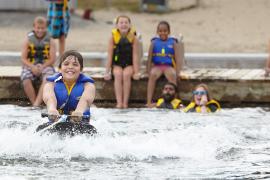Hello camp parents! My name is Laurie, and I recently joined ACA as the Director of Research. In this role, I facilitate Research 360, which is ACA’s new strategic focus on research and evaluation. The goals of this initiative are to conduct a 5-Year Impact Study on camp experiences and to help camps start and expand their own evaluation efforts.
Prior to this position I was a college professor, day camp director, and seasonal staff member at an ACA-accredited camp. But my most challenging camp role? Camp parent. Piecing together my family’s summer calendar is like playing the game of Memory on a wobbly table. On a Tilt-a-Whirl. Summer camp, sports, and family travel all need to be researched, scheduled, and paid for months in advance, and all three of these steps require a great deal of work — especially when the pieces keep moving around.
Researching and scheduling summer camp seems to take the most time and effort. You might think that, as an ACA employee, I have insider information or a detailed list of criteria for researching camps. Nope — selecting summer camps for my kids is largely about dates and cost. While there are lots of other criteria that we consider (ACA accreditation, for example), it quickly becomes too much information to juggle in my wobbly game of Memory. So, in the end, camp choice is far more about logistics than it is about rigorous criteria.
But there is one criteria I am adding to my list, and I think you should too: data. By data, I do not necessarily mean piles of numbers, but rather the information a camp uses to improve their programs and understand their impact. For some camps, this information might be results from a survey that assesses camper outcomes while, for other camps, it might be observations of their staff in action that they use to make improvements. Whatever the form, the use of data says a lot about a camp, and could be a way for you to get the most bang for your buck from your child’s camp experience. Here’s why:
- A camp that uses data is likely to have an overall culture of improvement, inquiry, and creativity. Evaluating camp programs is really difficult. Not only does it require time and expertise, but it requires camp administrators to be open to what they might find. An organization that supports this kind of openness is also one that is likely to engage its frontline staff — camp counselors and activity instructors — in decision-making in ways that other camps do not. And this translates directly into quality camp experiences because staff who feel more engaged are also more likely to implement program improvements as planned.
- A camp that uses data is likely to understand the relation between camp and school. Camps are up against tough competition for your child’s summertime hours, especially from academic-based “summer learning” opportunities. However, many colleges and employers are now recognizing the importance of 21st century skills, which include teamwork, critical thinking, and creativity. Camps who measure these outcomes know that what kids gain at camp translates directly into improved academic performance- and you can use these outcomes to help your child make connections between what they learned at camp and what they are doing at school.
- A camp that uses data values camper and parent input, which means that you have a voice in your child’s experience. I hesitated a little when writing this because I do not want to suggest that when a camp gives you a survey they are also giving you complete control over their program. But it does mean that you and your child have a voice, and that voice is powerful if you use it constructively. If a camp sends you a survey- take it!- and use this opportunity to provide useful feedback. Responding with all high number or all low numbers is not generally helpful; a variety of responses will help camps identify specific aspects of their program to focus on. Use open-ended questions to provide concise but usable feedback. Camps who survey parents and campers have lots of data to deal with, and lengthy or unhelpful feedback is likely to get ignored. Ensure your voice is heard by completing any survey the camp sends you right away and with careful thought.
Choosing a camp is not easy, and too many criteria make it even harder. Of the criteria you use, you might consider looking into the camp’s use of data, or, more broadly, the ways they collect and use information to make their decisions. Adding this to your list of things to think about might make your game of Memory even more difficult, or it might make the table less wobbly. In the meantime, check out our Research 360 blog to see all of the ways camps are thinking and talking about using evaluation to provide high quality camp experiences for your child.
Photo courtesy of Camp John Marc of Bosque County, Texas
The views and opinions expressed by contributors are their own and do not necessarily reflect the views of the American Camp Association or ACA employees.




